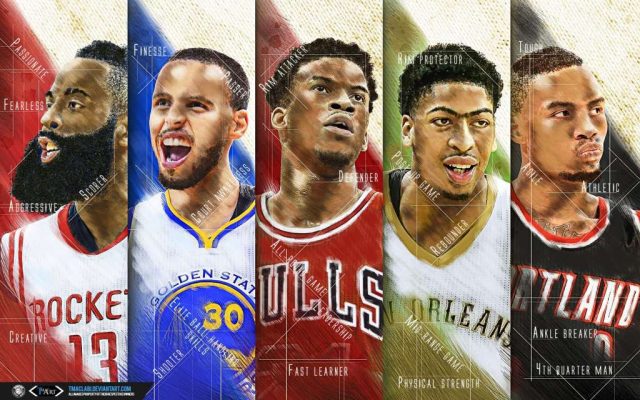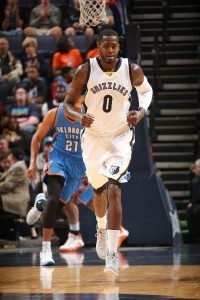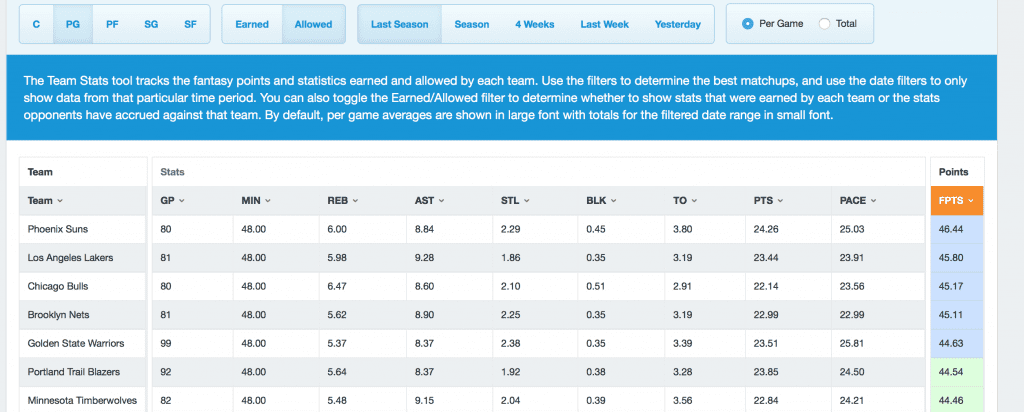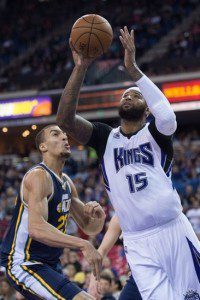
The NBA season is a few weeks away and we here at GoingFor2 can’t wait! The NFL season is great, don’t get me wrong, but nothing compares to the daily nature of the NBA from a DFS perspective, and the NBA is the only DFS sport where your score will literally change every few minutes. With FanDuel and Draftkings’ major legal troubles behind them (I know they aren’t 100 percent gone, but things are trending up), I’m expecting both sites to be promoting the NBA season heavily, which means new players, and new players will need some help building successful rosters. The following ten things will help you build a good team and hopefully help you win some money.
NBA DFS 101: Basic Strategies
1) Know the scoring system
The two major sites have a lot of similarities but are different enough that it will change your strategy depending on which site you decide to play. I prefer FanDuel personally, but I play both sites on a daily basis. Here is the two sites’ scoring system;
Daily Fantasy NBA Scoring
| FanDuel | DraftKings |
|---|---|
| 3-pt FG = 3pts | Point = +1 PT |
| 2-pt FG = 2pts | Made 3pt. shot = +0.5 PTs |
| FT = 1pt | Rebound = +1.25 PTs |
| Rebound = 1.2pts | Assist = +1.5 PTs |
| Assist = 1.5pts | Steal = +2 PTs |
| Block = 2pts | Block = +2 PTs |
| Steal = 2pts | Turnover = -0.5 PTs |
| Turnover = -1pt | Double-Double = +1.5PTs |
| Triple-Double = +3PTs |
The biggest differences are the bonuses for three-pointers, triple-doubles and double-doubles on DraftKings. DraftKings also deducts half a point for a turnover where FanDuel will deduct a full point.
2) What is a Cash Game and What is a GPP?
There are a few different types of contests for you to enter on FanDuel and DraftKings. There are 50/50’s, Leagues, Tournaments, Head to Heads, and Multipliers. These contests will fall into one of three categories; a Cash Game, a Non-Guaranteed Contest, and Guaranteed Tournaments. Let me break down the differences between the three:

**Cash Game
A Cash Game is any contest where you have at or near a 50 percent chance to win. These contests include 50/50’s ,in which exactly 50 percent of the entries will win money, Head to Heads and Double Ups. Double ups are not quite 50 percent, but they are close enough that you can still call them Cash Games. The prize money in these contests is the same for everyone no matter where you finish. If you enter a 100-man 50/50, the top 50 players win the exact amount of money whether you are first or 50th.
Non-Guaranteed Contest
A non-guaranteed contest is one that will not run if it does not fill. What does that mean? Let’s say you enter a 100-man league but only 95 people join. This contest will not run and everyone will be refunded their money (Some contests still run but there is no prize money. Everyone is still refunded their money.)
Guaranteed Tournament
These are often called “GPP’s” which stands for “Guaranteed Prize Pool”. These are contests that will run whether they fill up or not. They are your large tournaments with thousands of entries, typically the top 20 percent or so will cash. These contests have tiered levels of prizes, in-other-words, the higher you finish the more money you get.
**Cash games can be either guaranteed or non–guaranteed. Typically 5050’s are guaranteed whereas double-ups are not.
3) Understand What “Hitting Value” Means aka ROI (Return on Investment)

As I’m sure you already know, every player in DFS is assigned a price. That price is based on a number of factors. We won’t go into what those factors are because, frankly, no one really knows exactly what those factors are except FanDuel and DraftKings themselves. For the purposes of this article, we will just say their price is based on how good a player is. The better the player the higher his price.
Love our content? Check out the GoingFor2 Live Podcast Network!
Obviously, your goal in DFS is to score as many points as possible, but because there is a salary cap, you have to build your lineup with a good mix of top-level players and a few value players.
“How do you decide what a good value player is?”
I’ll explain.
I’m going to use FanDuel’s salary cap for this exercise because the math is easier. This is the simple formula:
(Salary/1,000) x 5 = Five Times Value or “Cash Game Value”
Basically, for every $1,000 you spend on a player you need him to score five points — or “five times value.” A player that costs you $10,000, for example, would need to score 50 FanDuel points to justify the price.
Hitting “five times value” is fine for Cash Games, but if you want to win a GPP, you need players to hit six times value or higher, and this is where we come to what we call “a value play.” A value play is a player that you project to hit above five times value. They are typically cheaper guys that can sometimes get you ten times value or more. For example, if a starter was receiving a planned rest day, and his backup was suddenly going to receive a ton of minutes, his price on FanDuel may only be $4,000. Hitting ten times value at $4,000 is 40 FanDuel points, which isn’t out of the realm of possibility.
That’s why it is very important to balance your values and your top-tier guys. As you can see, a guy costing you $10,000 has to score 50 just to reach his minimum value, but a guy at $4,000 can hit ten times his value and still score ten points less than the higher priced guy. But it is those cheaper guys that allow you to roster those top-tier players. A casual NBA may not even recognize some of the players we put into our lineups, but it’s those guys that can win you some money.
4) Knowing When and What “Lock” Is
“Lock” is quite simply the cutoff time to make roster changes to your lineup. That time is usually at the tip-off time of the first game on the slate, so if you are playing the Main Slate and the first game starts at 7pm than “lock” will be 7pm. Both FanDuel and DraftKings now have a “hard-lock” for NBA which means once the first game of the slate tips off, your entire roster is locked in, you can no longer late-swap players whose game have yet to start (DraftKings has late-swap in other sports at the time of this article).
The biggest thing with the lock is just knowing when it is, and being prepared to make last-minute decisions. Sometimes players are ruled out 10 minutes before the lock(sometimes even less), and you have to be ready to make changes. I will normally set an alarm on my phone to go off 15 minutes before lock to check my lineups and make sure none of my players have been ruled out for injury or for a planned “rest day.”
5) Vegas is Smarter Than You
Vegas has done projections and betting lines successfully far longer than any of us, and they have the hotels and casinos to show for it. The trick is knowing how to use Vegas spreads and lines to your advantage. There are two key things to look at when using Vegas for your DFS lineup — the Over/Under and the Spread.
The Over/Under is simply what Vegas has projected the combined score of both teams to be in any given game. Why is this important to DFS? Easy, the more points scored in a game means more fantasy points scored in that game. A game that has an over/under of 215, for example, would be a better game to target than a game with an over/under of 190.
The other metric to look from Vegas at is the “line” or the “spread.” This is simply which team is favored to win. Applying this to DFS, you want to avoid players from teams that are heavily favored to win because, if the game turns into a blowout, some of the players may rest in the fourth quarter. There is nothing more frustrating than cashing in your contest, having one of your players sit out the fourth quarter and you watch your lineup fall.
Neither of these things should be the end-all-be-all when building a good lineup but it is something you definitely need to consider if you want to consistently win money.
6) Understanding Defense vs Position (DvP)
One of the most important metrics in NBA DFS is “Defense vs Position” or DvP for short. The DvP stat is nothing more than how many fantasy points a team allows to a specific position. To explain how it works below is a DvP chart that can be found at
To explain how it works, below is a DvP chart that can be found at RotoGrinders.com.


Sometimes this stat can be misleading depending on how teams matchup, but for an overall look at how good or bad a team’s defense is against a certain position, this is an invaluable tool. As with most metrics, do not use this tool exclusively to build your rosters, but use it as a guide and a “tie-breaker” between players you are considering.
7) Pay Attention to Back to Back Games
Back to back games in the NBA can be brutal, especially if they are both on the road. Some coaches will rest their starters for the first half of a back to back, and some will rest them for the second half. Either way, as a DFS player, you need to pay attention to players that could take a rest day.
Some coaches will opt not to rest their starters in either game, but in these cases, you have to be careful with the second half of the back to back because some players, older players especially, may suffer from tired legs that may hurt their performance.
There is also the dreaded three games in four nights, which can also lend itself to fatigue or rest days.
8) Minutes, Minutes, Minutes
There is a lot of points scored in a typical NBA game, but one thing I can assure you, a player cannot score a single fantasy point if he is sitting on the bench. How many minutes a player plays will directly affect his performance. Bench players that get a lot of minutes are something you need to pay attention to when looking for your cheaper value plays. On some rare occasions, a bench player may get more minutes than the starter.
Another scenario where minutes can come into play is in the event of an injury or a planned rest day for the starter. The backup to that player will suddenly receive a lot more court time and will make a great “value play” on most occasions. Their FanDuel or DraftKings’ price tag will be that of a bench player, but with starter minutes could give you a starter’s point total — potentially giving you that coveted 6-to-8 times value.
9) Pace of Play

The pace of play is just what it sounds like, how fast, or slow, a team plays. A high paced team will obviously have more possessions per game. They like to push the ball up the court, take quicker shots than other teams, and they will typically be top third in the league in scoring. Targeting players that play on high-paced teams is something to take into consideration when building your lineups.
Now, there is one thing you have to think about when looking at high-paced teams. If a high-paced team is playing a slow-paced team, you may have to scale back your expectations for players on that team. The slow-paced team will attempt to play slower, thus limiting the higher-paced team’s possessions. Conversely, the slow-paced team in that scenario may see a slight uptick in production because the high-paced will push the speed of the game giving the slower team more possessions.
Okay, that sounds a bit confusing. Let me use a real world example. The fastest paced team in 2015 was the Sacramento Kings at 102 possessions per game and the slowest paced team was the Utah Jazz at 93 possessions per game. The Jazz would attempt to slow the game down, while the Kings will try to speed it up. The average pace of the two teams combined would be right around 97 possessions, meaning you should downgrade your projections for the Kings players while upgrading the Jazz players. Of course, it’s not always that cut and dry, but as a rule of thumb, the pace tends to favor the home team.
As with most of these metrics, you should never use them as the end-all-be-all when building lineups, but it could be used as a tie-breaker between similarly priced players.
10. Just a Couple More Things to Consider
- Look at Home/Road splits. Some players are far better at home than on the road — especially role players.
- The NBA can be a streaky game, pay attention to players on multi-game hot streaks and try to ride their streaks
- Some players tend to play much better against certain teams. You can quickly check out a player’s history against a certain team by going to DailyFantasyNerd.com and clicking on the player’s name. The highlighted line will be the games against his current opponent.
- Don’t over-react to breaking news. Changing your lineup at the last minute before lock normally doesn’t work out in your favor. My rule-of-thumb is unless one of my players have been ruled out, I won’t change my lineup. (There are some exceptions, like when the value is too good to pass up)
There are so many other strategies beyond the few I touched on here, but these are the basics that every successful player uses to build their lineups. If you start implementing these tactics when building your lineups instead of just picking a bunch of players that “fit”, you should be able to make a little money in DFS. Ignore these tactics and be prepared to get frustrated very quickly as you watch your bankroll disappear.
[wysija_form id=”10″]ATTN Dynasty Commissioners: Do you want to do something cool for your league? How about a 1-hour live show dedicated to YOUR league? Team-by-team breakdowns, rankings, and more. For details and to book a show, visit: GoingFor2.com/plp.






